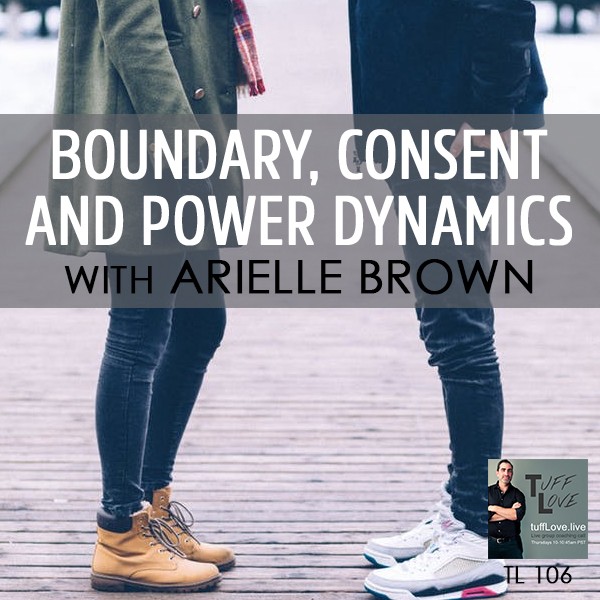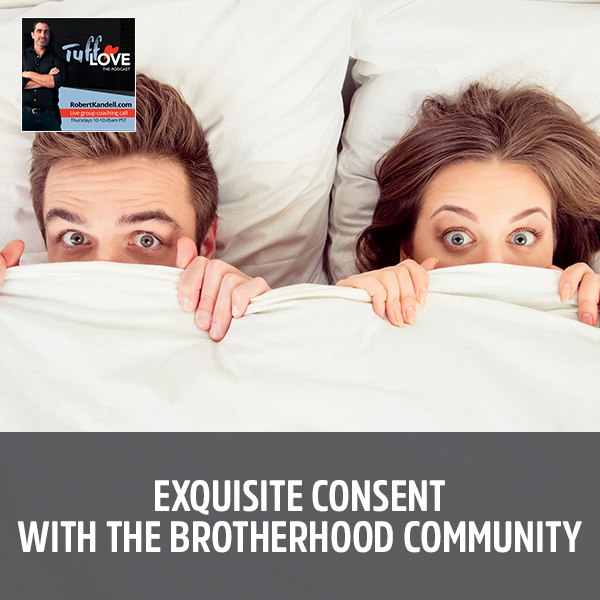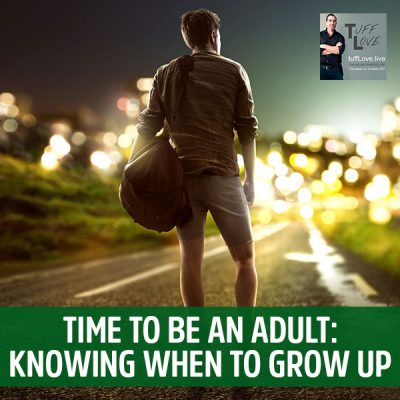
106: Six Conversations 1.1 – Boundaries, Consent & Power Dynamics
Jan 26, 2018
Checking in if a woman is still a “yes” until she is a “no” is a complicated discussion in itself. Knowing and respecting boundaries puts value on a woman, making her feel that she is an amazing person. However, men have to be conscious that they have this level of impact in the lives and experiences of women that is unseen yet very powerful. Saying yes or no doesn’t mean anything unless you make it mean something. Tuff Love expands its reach with a new series called “Six Conversations Between…” Weekly, two people will be having unfiltered and raw conversations around topics that exist between all of us: Love, communication, sexuality, and more. For our first series of six, I am joined by Arielle Brown for ‘Six Conversations between a Woman and a Man’. We dive RIGHT into the deep end of the pool by discussing boundaries, consent and power dynamics. With the explosion of the ‘Weinstein Effect’ and #MeToo, there was a lot to talk about. We engage in deep conversation about our own experiences, our own relationship to power and how we recommend you can engage with it.
106: Six Conversations 1.1 – Boundaries, Consent & Power Dynamics
This is a new type of Tuff Love premiering. It is a first of a series of many, many shows called Six Vulnerable Conversations. What will be happening is myself and a guest or my two women or two friends I know will be putting together a show. We’ll then be going to have six vulnerable, lively, unscripted conversations about various topics. From that I expect to hear, learn and see many great things. This is the first show of season one called Six Vulnerable Conversations Between a Woman and a Man, myself and Arielle Brown talking about boundaries, consent and vulnerability. It’s different than the usual Tough Love. Enjoy the show.
Live Coaching
Welcome for our first of Six of Vulnerable Conversations Between a Woman and a Man, that would be Arielle and me, about a variety of topics that we’ll be chatting about, taking these six topics, talking about them until they’re done. Let’s just us have six vulnerable dialogues and conversations about these topics. The first topic is about boundary, content and power dynamics. Three big things that are going on right about now. I hear in your story that you didn’t know much about your boundaries before the work. In other words, there wasn’t a conscious way you were thinking, “I want this food in my body or I want this person’s genitals in my body.” How would you describe your relationship to the concept of boundaries in the last ten years of your journey?
Boundaries will continue to be a process for me because my boundaries continue to evolve. Click To TweetI was just terrified of saying no because I was terrified of losing love. I feel like that pretty much sums up the majority of why people don’t assert boundaries. We’re afraid that the no means that people are going to leave or people are not going to be there anymore or we’re going to be made wrong. What I would say is boundaries will continue to be a process for me because my boundaries continue to evolve. What I’ve learned about myself is that the more I value myself and the more I realize that I’m actually a fucking amazing woman and I can actually trust my intuition and if something doesn’t feel good, it’s probably actually because it’s not good for me right now.
I don’t need to have a logical and rational explanation as to why. Simply the fact that I’m feeling a no in my body is enough, and I can just say that and that there’s nothing actually wrong with that. My ideal is that I attract people into my life and have relationships in my life where people really want me to say no and want me to respect my boundaries. A big thing has been letting go of relationships in my life where people have made me feel bad for what I feel or what I believe or what I want. That’s been huge.
I’m really curious about what you’ve learned about your impact upon women that you’re saying you didn’t necessarily realize your impact on women. In the conversation of boundaries, I’m curious what one of the greatest a-ha moments was for you around your impact upon women based upon your actions or your energetic expression that you didn’t initially realize.
We’ll go back to that moment, March 20th 1999. I was in a class. I was married at the time and Kara was sitting right next to me. I was doing my introduction. I was speaking so unaware of my impact and I thought, “I nailed this introduction, everyone’s going to love me.” The teacher was like, “Come up and teach with us.” That people would do the wave and clap. Instead the teacher said, “Do you know your wife’s crying?” She was sitting right next to me maybe a foot and a half away. I’ve told this story so many times but it was such a huge moment because there were two parts of this.
One, I had no idea about the impact I had on the woman I cared most at the time, my best friend. She had never felt free enough to say, “Rob, your words are misogynistic and cruel and they hurt my feelings.” She never felt the permission to actually authentically relate how my words impacted. We had a bravado misogynistic blowhard on me on some level and then a mute woman. The combination led to this way, I was jabbing her and she never told me and I never learned. I got in that moment both sides of the importance of it. My admission really comes down to, “For men to listen and women to talk,” because without that this level of impact that men have in women is unseen, not known and the cycle continues.
It’s a very interesting balance. I’ll share my experiences with different men. I have had men in my life who in every step of the way will just check-in on me, “Are you still a yes to this? Is this still good? How does this feel? Are you a yes?” In ways that feel genuinely good, nourishing and invite me to really feel the space to just be like, “Am I a yes in this moment?” I’ve had other men in my life where by no means actively violating my boundaries but there’s not that check-in. There’s this interesting thing of the beauty of what you’re saying, “Men really listening so that women can have the space to speak.” What would you say to why that’s necessary for extra space to be created for women as opposed to the standpoint of, “Women just need to speak up?”

Power Dynamics: Men really listening so that women can have the space to speak.
Let’s complicate this. If you ask a woman too many times, if I can speak for the man, the men’s perceptions is that, “She’s going to get annoyed and turned off and I’m going to ruin the mood. Can I do this?” Men don’t do it because we think, “We’re supposed to know. We’re supposed to be able to know when to take her shirt off, and when to put our fingers into her genitals. We’re supposed to know these things. If I asked, she’s going to think I’m a wimp.” The mental gyrations of a man takes our attention off the woman and onto this internal dialogue. That’s the complicated thing.
Women I know will say, “I don’t want to hurt his feelings. What if he leaves? I’m too much for a nudge. Will he think I’m a bitch because I’m asking for too much?” Both genders are having this vastly complicated internal dialogue and not even paying attention to each other because you’re stuck in the internal dialogue. I think that’s the core issue beyond the asking of consent. Not that it isn’t important but I think that’s the first thing to talk about.
I guess the question that comes up for me is, “How do we actually make boundaries and consent sexy?” How can this be something where it doesn’t have to be this thing, but instead creating a space where we can see how the boundaries and the consent conversation can actually be something that generates turn on?
Then there is the rape culture. Harvey Weinstein is blown up. You see on this “it was me” conversations, men are questioning, “When I touched her shoulder without permission, was I a rapist?” The extremities of it all. Men are so afraid to break those boundaries, which is getting more and more complicated. It is a mess out there. It’s important to know because this is a big piece of the puzzle.
It’s a complicated part of the question because amidst the #MeToo, and I’ve spoken about this before, my concern for the #MeToo Movement is that it runs the potential of actually having women identify even more with victimhood. I think it is so important for us, as women, to look at the places where we’re still attached to playing the victim. When we’re attached to that place it’s very easy to victimize and villainize men. That’s one of the challenges that I see with the Conscious Spirituality Movement is that so many women are empowered, independent and are conscious but there is this underlying fear of not feeling empowered and feeling like a victim, which I find can make it very easy for us to castrate or make it very difficult for men to not do everything perfect.
I think it’s one of man’s greatest fears. I think that’s one of my biggest fears to be falsely accused of being a perpetrator or violator or worst a rapist. I think my entire life, even though I’d describe myself as a misogynistic blowhard at some points in my life especially when I was nervous. On the flip side, I was really scared to death to be that guy, so I didn’t even approach women. Women are like, “You’re an idiot.” I’m like, “Why?” “Because I had been flirting with you for an hour.” I’m like, “You were?” Men have that fear as well. We don’t want to be known as the perpetrator. We don’t want to be that guy. We don’t even know what to trust anymore because you can’t trust women. They’ll say one thing and then all of a sudden they’ll say something different. We can’t trust ourselves because we don’t really know what the boundaries are. It’s this challenging place.
It’s a challenging place because we want to acknowledge as women that we’re conscious and spiritual and we also want to get fucked. That’s not the only thing. I just as much as I desire a deep, emotional sensitive, attuned connection and that can also take the form of fucking. We live in a culture that stigmatized women for desiring that type of intimacy, which can really screw us up around our desires.
We live in a culture that stigmatized women for desiring that type of intimacy. Click To TweetI saw a post referencing Young Frankenstein. There’s a scene where Frankenstein basically takes advantage of Lady Frankenstein. The next scene after the scene, she’s in the bed smoking with this very enjoyable look on her face. Just that, “Thank God, he took advantage of me.” Then there’s a scene, the first time Han Solo and Princess Leia flirting and he totally bypasses all her nos and her consent and makes a move on her. I read this article a long time ago that was like, “This was introduction to rape culture.” My hero, Han Solo, didn’t take Leia’s no. He’s a huge icon especially for kids of the ‘70s and ‘80s.
I desire to surrender and let go of control or this illusion of control in so many aspects of my life. I know for men, like my current partner, he have just me letting him take control. It has been the moments where I have gone against what I thought was better judgment but was actually just a surface layer of fear. I’ve had some of the most profound and deeply delicious experiences I ever could have imagined but it required me to let go of a no that was actually just like an attachment to trying to control things and keep things safe. That’s a very complicated place because it’s talking about playing with boundaries.
It’s playing with realizing that we’re sovereign beings and that hopefully we get to a place where we can choose whether or not we allow ourselves to be traumatized, which is another challenging, shaking sovereignty for the fact that trauma doesn’t need to occur but it can very easily. It tends to be in those places where we lean into our nos and explore what’s behind the no, that there actually can be some of the most beautiful experiences of liberation. That’s why so many people or so many women have the secret like submission. That’s why 50 Shades of Grey was as popular as it was because it’s a hidden desire so deeply.
50 Shades of Grey pisses off the BDSM community to no end because it messes with all their traditions a 100%. Let’s focus on this for a second. You had an experience where you are a no in your partner, David. Can you describe was it a physical experience? Was it a mental experience? Can you explain how you got through your no and what you learned from it?
This actually wasn’t a sexual experience. He and I were camping with a few of his friends from the Burning Man community. We may or may not have partaken in some hallucinogens the night before. There was this moment where I had plans to go home and meet up with a girlfriend to make music. His crazy, wildly friend wanted to go snowboarding down these huge sand dunes. My only experience of snowboarding was more experience on my ass than standing up. This guy was just a little crazy in the best of ways. I was just burning in this ambivalence of two different decisions that I can make.
One was safe and predictable, and one was trusting like this experience that David was facilitating. I had no way of predicting and trusting that I would be okay. I was just burning in it. There was all this chaos going on around us. He was like, “You know that you’re creating ambiguity for everyone right now just stewing in this situation.” I just decided to do it. I literally felt this desire to cry. I don’t know why, but it was this experience that I had no previous reference to, trusting that I would be safe. It was like something was dying in me from just surrendering control of not knowing what to expect. I wound up just having such a fucking amazing time. Coming back and feeling so empowered, just so turned on, so happy, it was a powerful experience for me.
That’s a great example and it’s a horrible example because you broke your own boundary. David, from that story that you referred, noticed you, recognized you, saw you, reflected back to you and just said, “You’re creating this ambiguity.” He didn’t tell you, “Get your ass on that bus, bitch, and surf that mighty sand.” He just said, “This is what I noticed.” That is a powerful friend. That is a powerful experience.
What do you mean I broke my own boundary though?
You had ambiguity, “Should I go home and do my status quo? Or should I do this crazy thing with this crazy guy that usually I ended up on my ass about?” You were sitting in the ambiguity. That’s my view of it. I could be wrong. You were playing with your own boundaries, “Should I stay or should I go now?” You’re playing The Clash in your head, you’re going back and forth. All he did was really positively, powerfully notice you. It sounds like you decided to break your own boundary and go about it.
I don’t think that’s a bad thing. I will say this, it’s a very important place for women to look. There is a lot of conversation around the places where women have been violated by men, especially if we’re conscious women committed to our growth work and we’re actively engaging in this path of personal growth. I prescribe to the belief that we constantly attract into our life experiences that reflect what is going on within us. I’ve had some interesting experiences of violation over the past three months and beneath my acknowledgment of being violated by a man, I have been looking at the places where, “Where did I actually violate myself because I allowed myself to be violated? Where have I abandoned myself?”
For most of my life, I have been perpetuating the energy of violation because I haven’t been in touch with and connected to my own boundaries. If we are women who desire to engage in our power with powerful men and have these amazing experiences, we need to take a responsibility for looking at where we’re not just advocating for ourselves and simply saying no.

Power Dynamics: We constantly attract into our life experiences that reflect what is going on within us.
Morgan and I have a lot of conversations. Morgan is my partner, my muse and we have a lot of conversations to that point. She really teaches me a lot about love, attraction and not so much in the fashionable law of attraction but how we do magnetize and we’re a match for that. If you want to grow this part of ourselves, you call in these experiences so you could learn and just really notice these things about yourself. I’m in total agreement about that.
How do we remove shame from the equation? Imagine how our personal growth and healing wounds would change if we just removed feeling shame about our choices and our experiences. Ultimately there is no right or wrong. There’s no bad or good experiences except we would probably prefer to not be violated. Shame does add a very interesting fuel to the fire because when we get on the other side of it, it’s just like, “Whoa.”
Let’s come back from that realm of responsibility, which I love. Let’s bring it back down to some more pragmatic things. That’s some advanced shit when you’re saying, “You’re violating yourself.” Let’s bring it back down to some practical things around consent and how did we do it? We’ve made a mess in the first 30 minutes of all these different challenges we’re facing and things we’re seeing. How do we relate? How do we have fun? How do we get well fucked? How do we learn to have boundaries that we can educate people to know, to honor, to listen to and then also play with when that’s appropriate?
One comes to mind that I really love and this is from a lover of mine. I like to play with power dynamics. I like to play with being restrained. I like to not know everything that’s going to happen to me before it happens. One of the things he conveyed to me specifically around consent was that, “Are we going to make the agreement that everything is a yes until you say no?” For me, that feels great because one, I have a lot of trust with this person and know that he’s turned on by my no. We’re also creating a container where the assumption is, “I’m a yes until I say no,” which gives a man permission to act on his desire. He knows that the woman is empowered to say no at any time. How can we actually create containers in our relationships where we discuss what consent looks like before we engage in the uncontrollable, involuntary act of passion?
The woman is empowered to say no at any time. Click To TweetThat’s a very core teaching of mine. Talk about your sex life when you’re not having sex. Talk about romantic life. Talk about your communication life. Create a plan, create communication bridges. Create a way for you guys to relate because in the heat of the moment you don’t want to be strategizing how to land a plane when the plane is crashing. You want strategies ahead of time to know what are your procedures when things grow amiss. What you’re referring to is something I love. I didn’t really know much about BDSM before my OneTaste experience. I learned a lot. I love the concept of safe words. Safe words really do make it safe. Safe words are words ahead of the time. Basically, the defaults are red, yellow, green. Green meaning, “Go, everything is great.” Yellow means “Can you slow down just a little bit? I’m hitting a boundary.” Red means, “Stop right now.” It sounds like you had some good safe words in your experience; no being the safe word.
I have a question for you. There’s a lot of conversation about men asking consent for women that tends to be the norm. I’m curious for you, where do you feel that you’ve been violated by women? Where do you wish women would embrace consent more or checking in dynamics with you?
I’ve had different phases of my life. The first 28 years I was a prime, true, vanilla yuppie. I don’t think I have had any violations because I didn’t put myself in any situations. I was very aware of my boundaries and I put myself in very protective ways. My Dad violated on some energetic level because he pushed his agenda onto me. That balance parents want to give and love and yet there’s that. My earliest violations were me saying yes to my dad and to my mom with things I didn’t want to do up to when I was 28. It wasn’t like I was a five-year-old. I was 28 and saying no.
That was my first experience, it was really in terms of not staying true to my parents. I was a restaurant server in Philadelphia at the ripe age of 23 or 24. I worked in a restaurant with a heavy population of gay servers. They’d love to torture me because I was a straight inexperienced white boy with so much desire and so disconnected from it. They would just torture me. They would flirt with me. They would touch me. They would fumble me. I’m like, “I like this but I don’t really like this.” There was no permission there. They just knew they could torture me, so they did.
Then the peak of that was on one party, this guy stuck his tongue down my throat. I didn’t have an experience before of someone bypassing my boundaries. It’s funny I totally forgot about it until this #MeToo thing. I totally forgot this experience. Back to women. When I was running OneTaste, I did that on some level from 29 or 30 until I was 44, it’s a 14 year experience. The main thing, to go back to your point, was I didn’t have my own boundaries. I said yes to whatever I thought was important for me to say yes to. One, to look good. Two, to protect my ego and my reputation. Three, because I didn’t want to get in trouble.
I was emotionally and energetically abused constantly in so many experiences by many women because I didn’t offer any boundaries. I would say yes where I would mean no. I realized the after effect was OM-ing. I’ve done over 11,000 OM’s in my career. I think I wanted to do about 1,000 of them, maybe 1,500, maybe 1,750, but it didn’t top too. I energetically did it really to avoid punishment. The practice was good for me but I wasn’t a solid yes to it. I was doing it to get along. I think that’s one of the biggest abuse is. I can’t blame anyone for that. That was my own choice. In therapy and plant medicine, I am discovering the depth of how I invalidated myself by not saying no.
It’s interesting for the men out there who have this story that if they just say yes to women like that’s the secret answer. What I’ve actually found is it’s not that. The surest way to feel disrespected and walked all over by a woman is to just not assert your boundaries. I was just having a conversation with David and we were getting into an argument, a heated discussion. I do this thing where he’ll try to explain what he’s saying. I’ll just be like, “No. That’s not true. That’s not what’s happening.” I’m just like, “Let me talk.” It was uncomfortable and at the same time even though I was uncomfortable, simultaneously my pussy got a little bit wet from it. It’s just like, “Thank you for letting me know that I can’t just handle the fuck out of you like I try to do with the rest of my life.” It’s actually what I want to do less despite what powerful, conscious spiritual women come off as. We actually really want to be handled. We just put up a lot of conscious and unconscious tests to actually see if we can trust a man enough to surrender to him.

Power Dynamics: Women just put up a lot of conscious and unconscious tests to actually see if they can trust a man enough to surrender to him.
I made a decision when I started dating Morgan. I just decided I wasn’t going to lie to her. I just made the decision because I have been lying to women my entire life. Lying by withholding, lying by trying to manipulate, lying by trying to avoid punishment; I have been lying, lying, lying. I just thought, “What would happen if I just base this whole relationship on being the truth?” Sometimes the truth changes. Sometimes I’ll say one thing and then through dialogue, we’ll change it to another. It’s not like it’s a static truth. In the moment, this is what’s true for me and I’ve asked her to do the same for me. For the most part for both of us, it’s really been powerful because I can trust her truth and she can trust mine.
One of the things I’ve found is that women like a yes in a man, but an authentic yes. If the answer is no, it’s not a no forever. It’s a no right now or it’s a no and it might be a yes if we changed this, or it’s a no and this is why. It’s like you’re letting her into my world of why the no is. Then she’s like, “That makes sense.” When I say no to a woman or no to Morgan and she doesn’t understand the motivation, then she feels rejected and women do not like rejection. I’ve noticed at all. Men don’t like rejection but we’re much better at it. Women do not like the rejection.
Because we think it means that we’re being abandoned. We don’t like that feeling.
It’s usually a no and it could be something from financial to emotional but that truth is so amazing and that’s where the best relating comes from. Then she knows where my boundaries are rather than some passive-aggressive yes and then a why. Morgan and I got into a heated discussion and I was a yes to her request, and it wasn’t a full yes. She called me out every time. She’s like, “How do you think that would feel if I said it that way?” I was like, “It would suck.” “What do you think it feels like?” “It sucks.” We kept talking and talking and it was a beautiful three-hour days of hell, not hell per se. Anyway, we got through it so it’s good. Consent, how do we do this? How do we do this where everyone feels like they’re themselves? What’s your parameters of a sexy, acceptable way for your partner or future partners or friends or colleagues to create consent package with you?
In all honesty, I feel like it starts with talking about our desires. Why don’t we lead with pleasure? If we’re going to have these really uncomfortable conversations around boundaries and consent, there’s got to be something really powerful. There’s got to be some intrinsic value there to have us lean in. My feelings are like, “Speak about the things that you really want and how to create circumstances where you can actually surrender into fully receiving them.” That’s what I would say.
What if you don’t know what your desires are? What if there is a guy and there’s a certain misogynistic qua but you don’t know what the qua is?
I give myself permission to go slow. When I’m feeling overwhelmed or things are moving too fast, I’ll slow things down and I’ll just make eye contact with the person. Often what I feel is necessary, everyone gets heated up in the moment. If I’m truly synced up with another person’s energy, if I’m really connected to a person and feeling them, I’m way less to violate their boundaries than if I’m just caught up in the heat of my own moment or up in my head. It’s a tricky game because it requires me to really stay present and connected to myself and to not just breeze over my own boundaries because that’s where it can get really murky. No man wants to hear, “You know that thing that we did that I was pretending I was a yes to? I was actually a no and I feel violated.” I don’t want to do that to a man. It requires a lot of courage on my part and on the part of women because we live in a culture that hasn’t really valued our boundaries especially when the answer to why is, “I don’t know. I just feel this way.”
That’s a skill set most men need to develop if they really want to play with consent boundaries and power dynamics.
Most of the time women need to train men because every woman is different. Click To TweetOur friend Ken Blackman, the thing that he talks about over and over again is, “Most of the time women need to train men because every woman is different.” Every woman is built differently and it requires a sovereignty and a willingness in women to take the lead, be willing to lead a man through these things. We live in a culture where we’re trained that men are supposed to take the lead. There’s an interesting calling to the plate so to speak that both men and women have right now, so that we can actually play full out in this magical and delicious game of relating.
I think what the Harvey Weinstein epidemic social change is showing, is it’s showing up in so many places. There are so many more revealing of sexual harassment from Olympic gold gymnast to Sacramento, California. It’s just showing up everywhere. It’s powerful. Really what it is is men just stopped listening. A woman would say overtly no or subtly no and a man wouldn’t listen. We’ve got a question, “Why are men on the hook for being the ones willing to dive into the breach?” I’ll challenge this question. I think men are the more overt ones diving into the breach and women are the more covert ones diving into the breach. What do you think?
Can you define the diving into the breach?
It’s basically these four soldiers are about to go into battle one last time, “Once more unto the breach, dear friends, once more.” It’s just diving back into battle together. Men have this assumption in society that they are the ones who need to speak or ask or ask consent or be the one to take the risk. Why do you think society tells us that men have to do that?
My honest response is that I don’t think that that’s the case or at least that’s not the perspective that I’m taking. I consider myself to be diving into the breaches so to speak in my own way and desiring to support women in doing the same. I think on the surface it’s easier to make it seem that men have more. Men have been in power on a visible, tangible level more so than women have. I think there’s different wounding that each of us need to work with. For men it’s working more with the perpetrator and for women it’s working more with the victim. I find that the perpetrator is learning more how to be in command of how they penetrate reality. Being able to learn how to control it or being in containment of it. For women, we’re learning how to be more penetrative with our words. That’s what I would say.
I’m thinking a lot about my relationships with women when I was numb and dumb. Women were really leading. They were the ones with the flirtation and the eyes and the straight conversations. I was chicken shit. I was scared to death of women. They were actually leading but it’s much more subtle. It just like men are big dogs with big tongues and big paws. Our tongues and paws are everywhere. I think women are like cats with their tails wagging slightly looking aloof. The point is there’s a way where it’s just been more covert. In today’s society, it feels like women are feeling more empowered to speak directly and boldly and honestly, which hopefully have them feel more comfortable diving into the breach.
The other piece that I wanted to speak to which I have compassion is it’s impossible to skip straight from victimhood to empowerment without expressing our pain and being witnessed. There’s an important healing step. A teacher of mine, she holds grief rituals because she says that, “The grieving process cannot complete until we’re witnessed in our grief.” I do wish that the sharing of women’s pain was done in a way that wasn’t so energetically directed at hurting men. That’s the biggest thing that I hold the most sadness around how the wounding is being expressed by women. It is important for anyone to express the emotions associated with trauma I think in order to transmute it and be in their power.

Power Dynamics: The grieving process cannot complete until we’re witnesses in our grief.
What did we learn? I feel like I made a big mess but hopefully we got some messiness discussion going on.
I feel like more than more important than trying to be profound and our exclamations is just creating a space where you can have permission to sound silly or say things that might not be politically correct.
It’s so masculine. I like the closed containers and I like the Is dotted and Ts crossed and the checkbox checked and all the vitamins in the right order. I like my supplements in alphabetical order.
I’m a woman who likes to be perceived as perfect and that I have my shit together all the time. I think we just need to feel like it’s okay to fuck up because we know at the core of what we’re looking for is connection here. I feel like that’s what we’re giving permission for right now.
The human condition is messy and this topic is messy. I think I’m grateful for having a partner where I can be messy, make mistakes, not do it perfectly, and then just stay connected so I can learn. I feel like I’m still learning. Eighteen years of focused personal work and every day I’m still learning something. I’m grateful for that.
I feel similarly and super grateful to be having these conversations with you as well.
Tell your friends about the most amazing conversation you’ve ever heard in your entire life between Arielle, a woman and Rob, a man. Take care. Love you.
Thank you for joining us for the first Six Vulnerable Conversations Between a Man and a Woman, myself and Arielle Brown. If you’d like to learn more about Arielle, please go to ArielleBrown.com. If you like to learn more about me, go to TuffLove.live. We’ll be back next week with our second episode of Six Conversations along with our regular show.
Resources mentioned:
About Arielle Brown
 Arielle is a Relationship Expert & Intimacy Educator. She specializes in helping people to create deeper connection and intimacy their relationships and greater community. In her private coaching work with singles and couples, she helps people create or revitalize relationships that are authentic to the needs, values and desires of each person. Her group facilitation and workshops focus on cultivating deeper levels of intimacy with others through conscious communication, energetic attunement and sensory awareness of the body. Learn more at www.ariellebrown.com.
Arielle is a Relationship Expert & Intimacy Educator. She specializes in helping people to create deeper connection and intimacy their relationships and greater community. In her private coaching work with singles and couples, she helps people create or revitalize relationships that are authentic to the needs, values and desires of each person. Her group facilitation and workshops focus on cultivating deeper levels of intimacy with others through conscious communication, energetic attunement and sensory awareness of the body. Learn more at www.ariellebrown.com.
Podcast: Play in new window | Download







